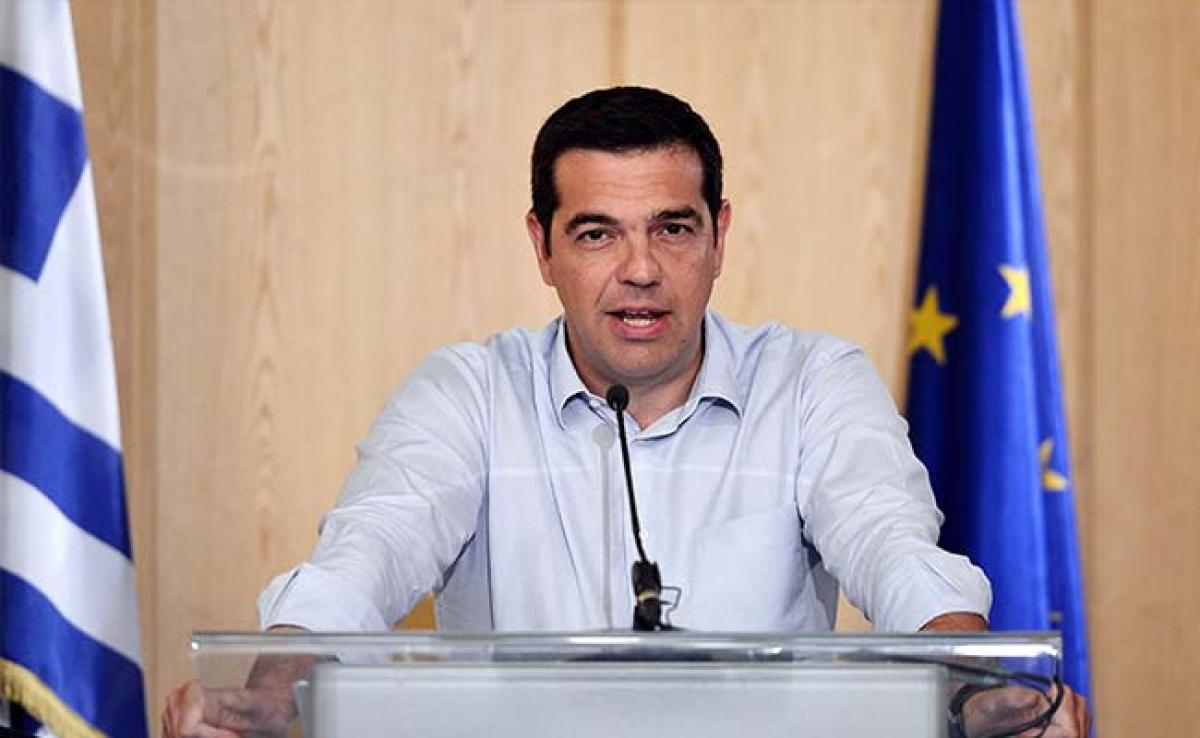Live
- Civic chief inspects Smart City project works
- PDSU flays govt apathy in solving students’ problems
- Contribution of tribals to freedom struggle ignored
- Modi dividing society: Pawar
- Downing Street says sorry for wine, non-veg food in Diwali menu
- Lokesh hailed for withdrawing cases against employees
- India’s economy in sweet spot with strong growth: Moody’s
- YSRCP govt failed to release sufficient funds for medical colleges, flays Minister
- Revanth offensive ahead!
- Resolve land-related issues in a transparent manner: Collector
Just In

x
Highlights
Former Greek Prime Minister Alexis Tsipras\' leftist Syriza will emerge as the biggest party in next month\'s election but without the majority it was hoping for, the first opinion polls since he resigned last week showed on Friday.
Former Greek Prime Minister Alexis Tsipras' leftist Syriza will emerge as the biggest party in next month's election but without the majority it was hoping for, the first opinion polls since he resigned last week showed on Friday.
.jpg)
One found that almost two thirds of voters felt Tsipras should not have sought a fresh mandate, while three surveys showed that his favoured coalition ally, the Independent Greeks party, would not make it into parliament.
The polls suggested his gamble to call early elections scheduled for Sept. 20 to consolidate his power base could backfire, though in one of the polls over a quarter of voters remained undecided, making the final outcome far from clear.
Syriza was supported by 23 percent of those polled by ProRata for Friday's Efimerida Ton Syntakton newspaper, with the conservative opposition New Democracy party second on 19.5 percent. The previous ProRata poll in early July showed a wider gap in Syriza's favour, putting the party on 26 percent compared with 15 percent for New Democracy.
Syriza would get 29 percent and New Democracy party 27.8 percent if elections were held now, a poll conducted by Metron Analysis for Parapolitika newspaper showed. The result includes undecided voters.
Another poll by the University of Macedonia for Greek Skai TV showed Syriza leading the conservative opposition by three percentage points, with 61.5 percent saying Tsipras had pursued a wrong negotiating strategy with official lenders.
Syriza would get 25.3 percent of the vote versus 23.2 percent for New Democracy party another survey by polling company Marc for Alpha TV showed.
Tsipras remained the most popular political leader with 41 percent of voters having a positive or very positive view, with New Democracy leader Vangelis Meimarakis not far behind with 34 percent, according to ProRata.
But 64 percent of Greeks said they believed Tsipras's move to call snap polls was wrong, while 68 percent agreed that Greece must stay in the euro zone at any cost, even if that meant further austerity.
"The answers to these two questions lead to the conclusion that early elections may cost the (former) prime minister and Syriza," the newspaper said.
The presidency on Friday issued a decree confirming Sept. 20 as the election date.
A SECOND ROUND OF ELECTIONS?
A caretaker government led by Supreme Court judge Vassiliki Thanou was sworn in earlier, comprising both technocrats and political figures.
The latter include George Chouliarakis, who was part of Greece's bailout negotiating team under Syriza, as interim finance minister.
An ally of the former deputy Prime Minister Yannis Dragasakis, Chouliarakis took a decisive role in the talks in the summer and his appointment is likely to be seen as a positive for keeping the country's bailout programme on track.
"The basic goal is continuity so that precious time is not wasted. There has to be progress on the issue of reinforcing the Greek banking system as quickly as possible," Chouliarakis said during the handover ceremony.
The head of the council of euro zone finance ministers, Jeroen Dijsselbloem, urged the interim government to continue preparations to implement the bailout during the run-up to the election and said Chouliarakis "knows what he's doing".
Nikos Christodoulakis, who served as economy minister from 2001-2004 under the Socialist PASOK government, took the other key portfolio of economy, shipping, tourism and infrastructure.
Tsipras abruptly resigned last week days after clinching an 86 billion euro ($97.2 billion) bailout package from European and International Monetary Fund lenders, hoping to crush a rebellion by far-left lawmakers and tighten his grip on power.
Popular Unity, the party formed last week by Syriza rebels who oppose the bailout, was backed by 3.5 percent in the ProRata poll - above the 3 percent threshold needed to enter parliament - and 4.1 percent in the poll by Metron Analysis.
The University of Macedonia poll showed it would score 5 percent.
But the Independent Greeks, the ally in Tsipras' former coalition government, scored roughly 2 percent in three polls, meaning Syriza would be forced to seek another coalition partner.
Tsipras this week ruled out cooperating with the main pro-euro opposition parties - New Democracy, the Socialist PASOK and the centrist To Potami. The poll's result suggested that, in that event, the country would face a second round of elections.
Still, with Syriza's move to accept the EU/IMF bailout, the next parliament will continue have a substantial majority of pro-bailout parties, meaning the country's future in the euro zone looks more secure than it did at the start of the year.
One third of those who supported Tsipras' party in the January 2015 elections that took him into office said they were unsure if they will do so again, the ProRata poll said.
It also showed 25.5 percent of voters were still undecided, making them the biggest bloc.

Next Story
More Stories
ADVERTISEMENT
© 2024 Hyderabad Media House Limited/The Hans India. All rights reserved. Powered by hocalwire.com







